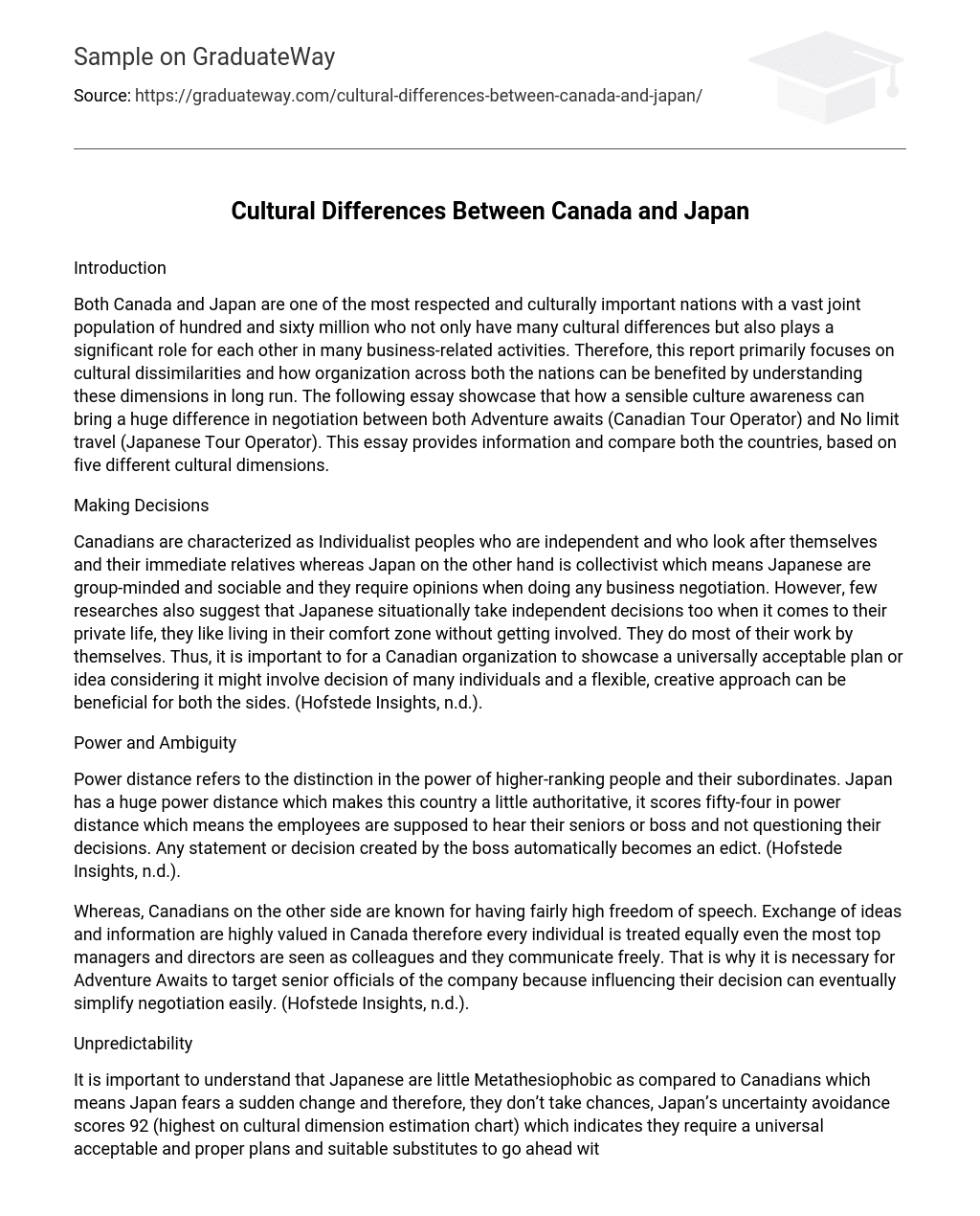Introduction
Both Canada and Japan are one of the most respected and culturally important nations with a vast joint population of hundred and sixty million who not only have many cultural differences but also plays a significant role for each other in many business-related activities. Therefore, this report primarily focuses on cultural dissimilarities and how organization across both the nations can be benefited by understanding these dimensions in long run. The following essay showcase that how a sensible culture awareness can bring a huge difference in negotiation between both Adventure awaits (Canadian Tour Operator) and No limit travel (Japanese Tour Operator). This essay provides information and compare both the countries, based on five different cultural dimensions.
Making Decisions
Canadians are characterized as Individualist peoples who are independent and who look after themselves and their immediate relatives whereas Japan on the other hand is collectivist which means Japanese are group-minded and sociable and they require opinions when doing any business negotiation. However, few researches also suggest that Japanese situationally take independent decisions too when it comes to their private life, they like living in their comfort zone without getting involved. They do most of their work by themselves. Thus, it is important to for a Canadian organization to showcase a universally acceptable plan or idea considering it might involve decision of many individuals and a flexible, creative approach can be beneficial for both the sides. (Hofstede Insights, n.d.).
Power and Ambiguity
Power distance refers to the distinction in the power of higher-ranking people and their subordinates. Japan has a huge power distance which makes this country a little authoritative, it scores fifty-four in power distance which means the employees are supposed to hear their seniors or boss and not questioning their decisions. Any statement or decision created by the boss automatically becomes an edict. (Hofstede Insights, n.d.).
Whereas, Canadians on the other side are known for having fairly high freedom of speech. Exchange of ideas and information are highly valued in Canada therefore every individual is treated equally even the most top managers and directors are seen as colleagues and they communicate freely. That is why it is necessary for Adventure Awaits to target senior officials of the company because influencing their decision can eventually simplify negotiation easily. (Hofstede Insights, n.d.).
Unpredictability
It is important to understand that Japanese are little Metathesiophobic as compared to Canadians which means Japan fears a sudden change and therefore, they don’t take chances, Japan’s uncertainty avoidance scores 92 (highest on cultural dimension estimation chart) which indicates they require a universal acceptable and proper plans and suitable substitutes to go ahead with negotiation. Whereas, Canadians accept new ideas, innovation easily and they like trying something new or different. Canadian culture is not rules-oriented and they tend to be less emotionally expressive than cultures scoring higher on this dimension. (Hofstede Insights, n.d.).
In regards to Japan, many factors that affect their decision are carefully analyzed, considered, and discussed. It is a lengthy process and requires a great deal of patience. A strong communication and building a healthy relation are the key to unlock best possible negotiation. (Katz, 2008)
How the Time is Perceived?
Japan is highly polychronic which means time is more flexible for Japanese; they are multitaskers and can be monochronic too while dealing with foreigners. Meanwhile, Canadians like to stick to time, they don’t do multiple things at once they rather work according to their schedules. It is advisable to meet the expectations within a certain time limit because time pressure can be difficult to counter and in extreme cases, Japanese may try to renegotiate the whole deal on the final day of your visit. Hence it is important to avoid such open conflicts. (Katz, 2008)
Communication Distinction
Japanese are believed to be more sarcastic as compared to Canadians because they use indirect communications far more than any country. Japanese use nonverbal cues and they expect that the receiver will understand meaning and that is why Japan belong to a high context culture whereas, in Canada, content plays a big role. Hence, vocal and verbal communication is required at every level. The message should be straight and explicit and that is why Canada has a low context culture. Gestures are usually very subtle in Japan. It is strongly advisable to restrict your body language. Non-verbal communication is very important, though, and you should carefully watch for others’ small hints, just as they will be watching you. (Katz, 2008)
Attitude and Approach
Almost a century ago both Canada and Japan formalized diplomatic relations and since then both the nations have been working closely do develop these economic ties. (The Canadian Trade Commissioner, n.d.).
Good economic relations are fine but both the countries should know which the better approach to use in conflict is and how to act at the time. It is always seen that Japan tend to resolve conflicts using best possible methods in any situation of conflict or disputes. The team doing business with Japan could also be ready to get an answer or satisfactory compromise.
Canadians find the conflict and competition, constructive. They often compromise and find a much better answer to resolve any kind of conflict. (Katz, 2008)
Conclusion
As per the discussion stated above, it is clear that Canadian and Japanese belong to totally different cultures. Where Canadians are individualist, Japanese collectivist. Canada is monochronic and Japan is polychronic. Canada has low context culture, while Japan has high context culture. Also, power distance in Canada is low as compared to Japan. The differences on the field of conflict are not too severe. In long run, there are possibilities of success in future. This can be easily assumed after the comparison of both the countries. The Adventure Awaits company is now able to understand the culture, identify their business attitudes and its influences on their approaches.





